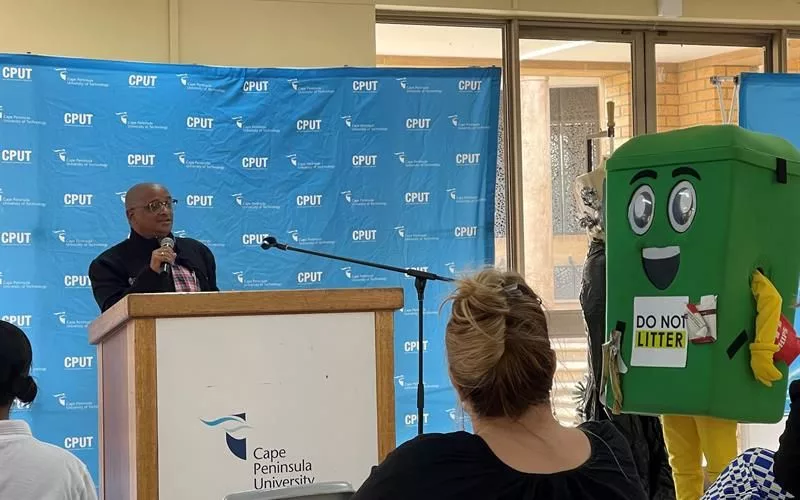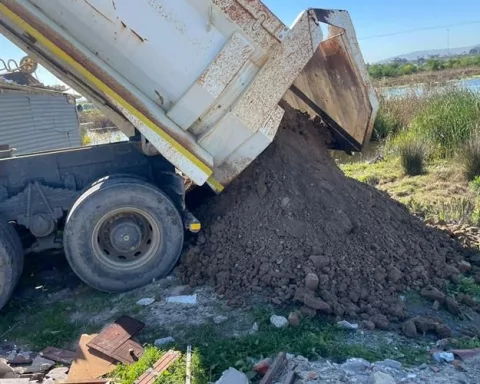Cape Town’s Waste Education Week, a joint effort by CPUT and GTP, aims to create a culture of treating waste as material to be sorted, recycled, and reduced. CPUT has introduced a three-bin separation system across all its campuses to become Cape Town’s first zero-waste university. The initiative serves as a model for sustainable living, emphasizing the significance of partnership and collaboration in achieving sustainability goals. The effects of this initiative are anticipated to reach far beyond the boundaries of the CPUT campus, marking a substantial stride towards environmental stewardship.
Cape Town’s Waste Education Week at CPUT is a collaborative effort between CPUT and GTP to cultivate a culture of treating waste as material to be sorted, recycled, and reduced. CPUT introduced a three-bin separation system across all its campuses to obtain the status of being Cape Town’s first zero-waste university. The Waste Education Week initiative serves as a model for sustainable living and a potent call for sustainability, emphasizing the significance of partnership and collaboration in achieving sustainability goals.
A Noteworthy Event at Cape Town Peninsula University of Technology
On Tuesday, 11th June 2024, a palpable excitement and renewed determination pervaded the atmosphere at the Cape Peninsula University of Technology (CPUT). The reason behind the enthusiasm was the induction of Waste Education Week, an initiative birthed by the collaborative efforts of CPUT and The Greater Tygerberg Partnership (GTP). The event was graced with an impactful speech by Alderman Grant Twigg, the Mayoral Committee Member for Urban Waste Management, who hailed the significance of the event.
In a metropolis like Cape Town, where the need for sustainable practices is progressively urgent, the Waste Education Week offers a vision of an optimistic future. The initiative strives to cultivate a culture that treats waste not merely as disposable, but as material to be sorted, recycled, and reduced. Noble in its endeavor, CPUT introduced a three-bin separation system across all its campuses, differentiating waste into organics, recyclables, and non-recyclables. This move forms a part of a larger ambition – to obtain the status of being Cape Town’s first zero-waste university.
The “Better.Bellville.Together” Program: A Step in the Right Direction
The Waste Education Week at CPUT, affectionately termed the “better.bellville.together” program, stands as a significant milestone on the pathway towards sustainable living. The operative term in this context is ‘together’, underscoring the essence of cooperation and mutual assistance. This unified mission aims to accomplish more than just waste reduction – it seeks to redirect waste away from landfills, giving due consideration to the city’s overarching sustainability objectives.
The joint venture between CPUT and GTP shines as a testament of unwavering dedication to waste reduction strategies and the unceasing quest for sustainable practices. Their Waste Management Programme and the successful inauguration of the three-bin system has set a commendable precedent for other institutions and communities. The initiative goes beyond being merely a program; it is a potent call for sustainability, a blueprint that others can replicate to create a significant positive impact on the environment.
Impact and Beyond: A Model for Sustainable Living
Waste Education Week functions as an enlightening platform that motivates individuals and instills a deep-seated sense of environmental accountability. It equips students, staff, and participants with knowledge and practical ways to nurture a culture of sustainability. The effects of this initiative are anticipated to reach far beyond the boundaries of the CPUT campus, marking a substantial stride towards environmental stewardship.
The essence of Alderman Grant Twigg’s address was the significance of partnership and collaboration. He emphasized that only with a collective vision can the colossal targets of waste reduction, landfill diversion, and environmental conservation be achieved. He implored the listeners to magnify the significance of their actions, embrace mutual collaboration, and become agents of transformation. His evocative words encapsulated the essence of the initiative – steering the mission to make sustainability not just an ideal, but a lifestyle.
Collaborative Efforts: The Key to Achieving Sustainability Goals
The Waste Education Week initiative by CPUT and GTP serves as an invigorating reminder of the extraordinary outcomes achievable when establishments unite for a shared purpose. This partnership stands as evidence of their resilience, dedication, and vision for a sustainable future. As we progress, it is critical to remember the importance of collaboration. Let us work in unison to craft a world where sustainability is embedded in every aspect of life, not merely as a coveted goal but as a practicable reality.
What is Cape Town’s Waste Education Week, and what is its aim?
Cape Town’s Waste Education Week is a collaborative effort between CPUT and GTP to cultivate a culture of treating waste as material to be sorted, recycled, and reduced. The initiative’s aim is to create a culture of treating waste sustainably and to become Cape Town’s first zero-waste university.
What is the three-bin separation system, and what is its significance?
The three-bin separation system is a system introduced by CPUT to differentiate waste into organics, recyclables, and non-recyclables. Its significance lies in its contribution towards CPUT becoming Cape Town’s first zero-waste university.
What is the “better.bellville.together” program, and what is its goal?
The “better.bellville.together” program is a joint venture between CPUT and GTP that seeks to redirect waste away from landfills and towards the city’s overarching sustainability objectives. Its goal is to create a culture of sustainable living.
What is the impact of Waste Education Week, and how far-reaching is it?
Waste Education Week functions as an enlightening platform that motivates individuals and instills a deep-seated sense of environmental accountability. The effects of the initiative are anticipated to reach far beyond the boundaries of the CPUT campus, marking a substantial stride towards environmental stewardship.
How significant is partnership and collaboration in achieving sustainability goals?
Alderman Grant Twigg emphasized the significance of partnership and collaboration in achieving colossal targets of waste reduction, landfill diversion, and environmental conservation. The partnership between CPUT and GTP stands as evidence of their resilience, dedication, and vision for a sustainable future.
What is the significance of Waste Education Week in the larger context of sustainability?
Waste Education Week serves as a model for sustainable living, emphasizing the significance of partnership and collaboration in achieving sustainability goals. It is a potent call for sustainability, a blueprint that others can replicate to create a significant positive impact on the environment.












